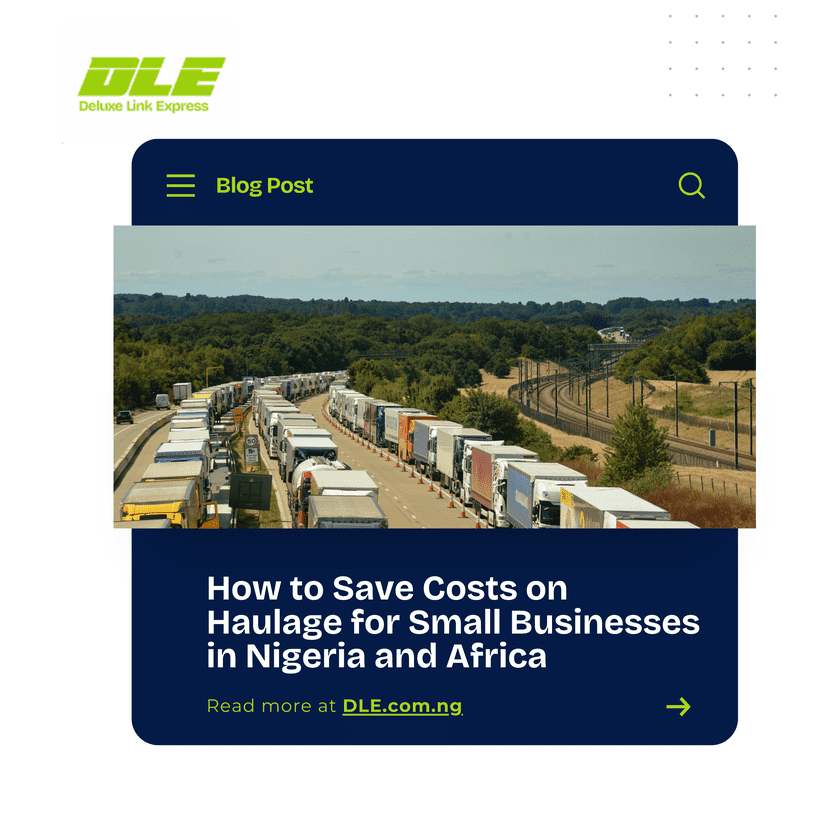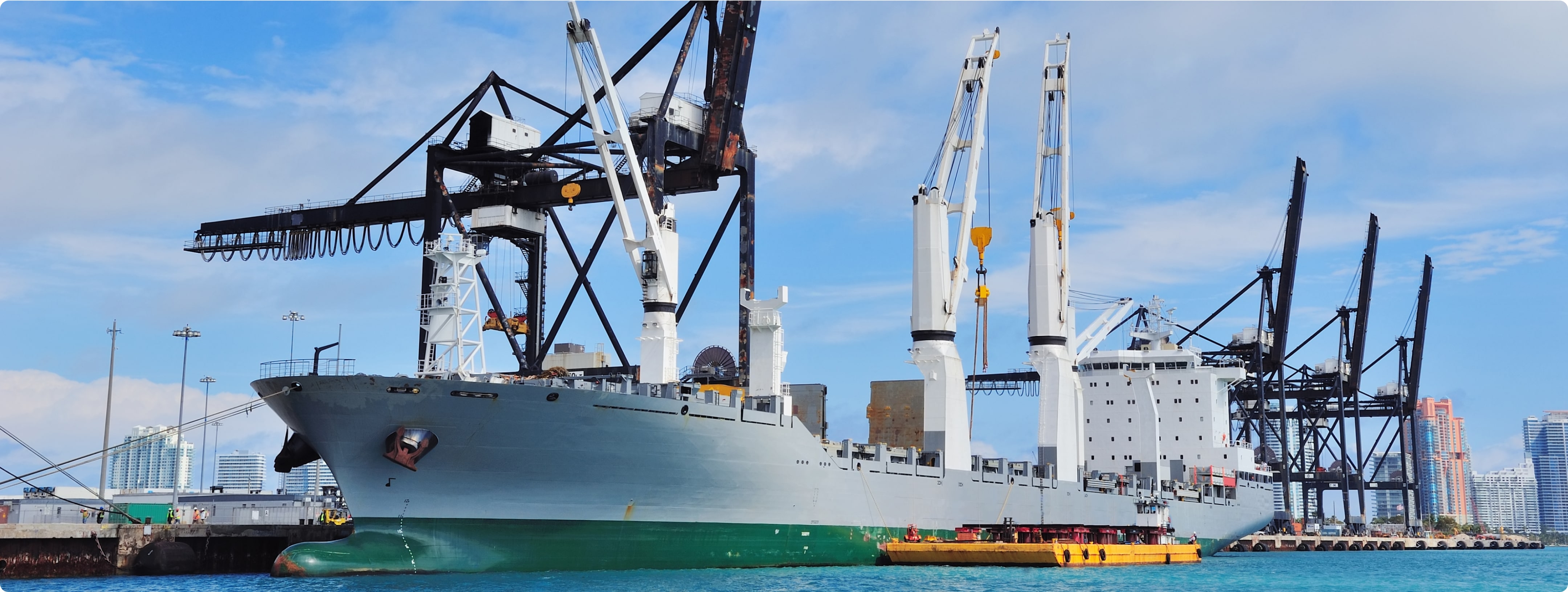
Our Blog
 Olivia
Rhye •
20 Jan 2024
Olivia
Rhye •
20 Jan 2024
How do you create compelling presentations that wow your colleagues and impress your managers?

<p>Running a business in Nigeria comes with its own set of challenges. And if you're in e-commerce or distribution, logistics is probably one of your biggest headaches.</p> <p>Here are the top 7 logistics challenges businesses face in Nigeria — and practical solutions to overcome them.</p> <p>1. Unreliable Delivery Timeframes<br>Customers want fast delivery. But poor road infrastructure, traffic, and weather can cause delays.</p> <p>Solution: Partner with a logistics provider that offers same-day and next-day delivery and has contingency plans for high-traffic areas.</p> <p>2. Lack of Real-Time Tracking<br>Many delivery services still don’t offer package tracking. This leaves customers anxious and damages trust.</p> <p>Solution: Use a logistics partner with tech-enabled tracking so customers can follow their order in real time — and you stay updated too.</p> <p>3. Inconsistent Customer Service<br>Delayed responses or poor conflict resolution from delivery companies can frustrate your customers and reflect badly on your brand.</p> <p>Solution: Work with a provider that offers 24/7 customer care and supports vendor escalation channels.</p> <p>4. Package Loss or Damage<br>Lost or mishandled goods are costly — especially for small businesses.</p> <p>Solution: Choose a provider that trains their riders and provides insurance or package security protocols.</p> <p>5. Delivery Cost Uncertainty<br>Some logistics partners charge confusing or inconsistent rates.</p> <p>Solution: Use a service that offers transparent pricing and possibly discounts for repeat vendors or bulk deliveries.</p> <p>6. Limited Nationwide Coverage<br>Many businesses want to scale, but some delivery companies only operate in Lagos or a few states.</p> <p>Solution: Find a logistics partner with a national network or structured partnerships across states.</p> <p>7. Lack of Vendor-Focused Support<br>Most logistics platforms focus on the end customer, not the vendor.</p> <p>Solution: Partner with a logistics team that understands vendor needs, offers account management, and marketing support.</p> <p>Final Thoughts:<br>As a vendor or business owner, your logistics provider is an extension of your brand. Don’t settle for one that slows you down.</p> <p>DLE Logistics is built with Nigerian vendors in mind — from real-time tracking to affordable same-day deliveries and dedicated vendor support.</p> <p>Want a reliable partner? Get in touch today</p>

Odoh Tobe
25 Apr 2025
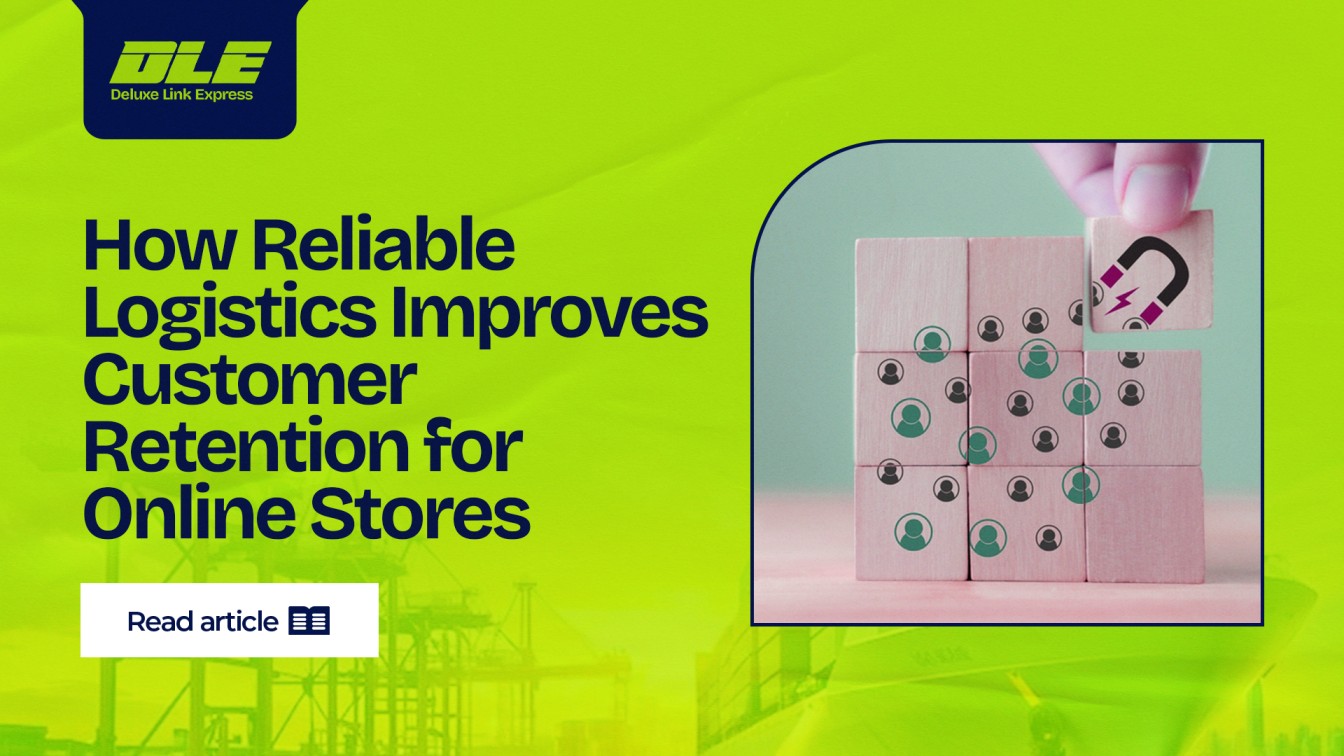
<p>In today’s fast-paced e-commerce world, winning a customer once isn’t enough. The real success lies in keeping them coming back. And one of the most underrated ways to do that? Reliable logistics.</p> <p>For online store owners in Nigeria, where trust and speed are critical, a smooth delivery experience can make or break your customer relationship.</p> <p>Here’s how strong logistics helps you retain more customers:</p> <p>1. Fast Delivery Builds Trust<br>Customers love convenience. If they know your store consistently delivers on time, they’re more likely to return. Delays without updates damage trust fast — and trust is hard to rebuild.</p> <p>DLE Logistics' same-day and next-day delivery services help brands keep promises and exceed customer expectations.</p> <p>2. Real-Time Tracking Reduces Anxiety<br>Your customer wants to know: “Where is my order?” With real-time package tracking, they don’t need to ask — they just check. This transparency builds confidence in your brand.</p> <p>3. Good Delivery = Better Reviews<br>Customers who receive their orders quickly and without stress are more likely to leave positive reviews or refer others. Happy delivery = happy word-of-mouth.</p> <p>4. Fewer Returns, Fewer Complaints<br>Reliable logistics reduce issues like:</p> <p>Damaged goods from poor handling</p> <p>Late deliveries that lead to order cancellations</p> <p>Wrong package deliveries</p> <p>All these affect customer satisfaction and your bottom line.</p> <p>5. It Makes Your Brand Look Professional<br>Customers judge your brand by every touchpoint. From website to delivery. If your logistics feel organized and intentional, your business feels more premium and dependable.</p> <p>In Summary:<br>Reliable logistics isn’t just about moving packages. It’s about moving your business forward by keeping your customers happy, informed, and loyal.</p> <p>If you're ready to reduce delivery complaints and increase retention, it’s time to switch to a logistics partner that grows with your business.</p> <p>Talk to DLE Logistics today</p>

Odoh Tobe
25 Apr 2025

<p>The AI Revolution in Nigerian Logistics The rise of artificial intelligence (AI) is transforming industries worldwide, and logistics is no exception. From route optimization to demand forecasting, AI is reshaping how goods move across Nigeria. As the sector evolves, businesses must not only embrace AI’s benefits but also prepare for its challenges.</p> <p>In Nigeria, where logistics plays a crucial role in commerce—from e-commerce deliveries to large-scale manufacturing supply chains—AI presents an opportunity to boost efficiency, cut costs, and improve reliability. However, its adoption comes with hurdles, including infrastructure constraints and workforce adaptation.<br>How AI is Changing the Logistics Landscape in Nigeria 1. AI is Boosting Efficiency but Also Reshaping Jobs AI-powered logistics systems are helping companies:</p> <p>Optimize delivery routes, reducing fuel costs and travel time.<br>Predict vehicle maintenance needs, extending fleet longevity.<br>Automate warehouse management, minimizing errors and speeding up operations.</p> <p>However, as AI automates traditional logistics roles, businesses must rethink workforce strategies. Rather than seeing AI as a threat, companies should invest in upskilling employees to manage and interact with AI-driven systems.</p> <p><br>Smarter supply chains mean faster and more reliable deliveries. AI enhances supply chain visibility, enabling businesses to predict demand surges and avoid stock-outs. For example, AI-driven inventory management helps retailers and manufacturers keep the right amount of stock at the right time.</p> <p>However, Nigeria’s infrastructure challenges—such as inconsistent power supply and internet connectivity—could slow AI adoption. Logistics firms must work with tech providers to implement AI solutions tailored to the local environment, such as offline-capable AI tools and energy-efficient data centres.</p> <p>AI Cuts Costs, But Global Chip Shortages Pose Challenges ai-driven logistics tools depend on semiconductor chips. The ongoing global chip shortage and US-China trade tensions have affected the availability of these chips, increasing costs and delaying AI implementation.</p> <p>To navigate this, Nigerian logistics firms should prioritize cloud-based AI tools over high-end AI hardware. This reduces reliance on physical AI infrastructure while still leveraging the benefits of machine learning and automation.</p> <p>AI Regulation & Data Security Will Become CriticalAs AI adoption grows in logistics, businesses must prepare for:</p> <p>Stricter data security laws to protect customer and shipment information.<br>Future regulations around autonomous delivery (e.g., drones and self-driving vehicles).</p> <p>Businesses need to start taking AI governance seriously by implementing strong data protection policies and staying ahead of regulatory changes.</p> <p>What Nigerian Businesses Must Do Now To stay competitive in an AI-driven logistics sector, businesses should:</p> <p>Adopt AI early – Start with simple AI tools like automated tracking and predictive analytics before scaling up.</p> <p>Invest in workforce training – Equip employees with the skills to work alongside AI rather than be replaced by it.</p> <p>Stay informed on AI developments – Understand how AI regulations, innovations, and global trends will impact logistics operations in Nigeria.</p> <p>The Future of Logistics in Nigeria is AI-Driven. AI is no longer a futuristic concept—it’s happening now. Businesses that embrace AI-driven logistics will reduce costs, improve efficiency, and gain a competitive advantage in the evolving market.</p> <p>Are you ready for the AI-driven future of logistics? Let’s discuss in the comments!</p>

Odoh Tobe
27 Mar 2025

<p dir="ltr">The oil and gas sector is a dynamic, competitive landscape, requiring companies to adopt innovative strategies to stay ahead. To achieve sustainable growth and profitability, businesses can focus on four core strategies: targeted market segmentation, strategic alliances, streamlined operations, and diversification. These approaches enable companies to address challenges effectively while exploring new opportunities.</p> <p dir="ltr"> </p> <h3 dir="ltr">Understanding and Leveraging Market Segmentation</h3> <p dir="ltr">Market segmentation involves identifying distinct groups within a broader market based on factors like geography, customer preferences, or industry focus. This strategy allows businesses to customize their services and marketing efforts, delivering more personalized solutions. The benefits of this targeted approach include:</p> <ul> <li dir="ltr" aria-level="1"> <p dir="ltr" role="presentation">Enhanced Customer Relationships: Tailored offerings resonate better with specific groups, building trust and loyalty.</p> </li> <li dir="ltr" aria-level="1"> <p dir="ltr" role="presentation">Optimized Marketing Campaigns: Focused efforts lead to higher engagement and return on investment.</p> </li> <li dir="ltr" aria-level="1"> <p dir="ltr" role="presentation">Efficient Resource Utilization: Concentrating resources on high-potential segments ensures maximum impact.</p> </li> </ul> <p> </p> <p dir="ltr">For instance, a company might focus on providing renewable energy solutions in urban areas while targeting traditional oil services to industries in rural locations.</p> <h3 dir="ltr"><br><img src="https://cdn.dle.com.ng/media/uploads/2025/03/image_67dae74b4eb54.jpg" alt="" width="667" height="451"></h3> <h3 dir="ltr"> </h3> <h3 dir="ltr">Forging Strategic Alliances</h3> <p dir="ltr">Collaborating with the right partners can significantly amplify a company's market presence and operational capabilities. Partnerships with producers, distributors, or tech innovators allow companies to:</p> <ul> <li dir="ltr" aria-level="1"> <p dir="ltr" role="presentation">Expand Reach: Entering new markets or strengthening footholds in existing ones becomes easier.</p> </li> <li dir="ltr" aria-level="1"> <p dir="ltr" role="presentation">Share Resources: Pooling expertise and infrastructure reduces costs and operational burdens.</p> </li> <li dir="ltr" aria-level="1"> <p dir="ltr" role="presentation">Deliver Comprehensive Solutions: Collaborations enable end-to-end service delivery, improving customer satisfaction.</p> </li> </ul> <p dir="ltr">An example might be forming a joint venture with a renewable energy company to broaden product offerings and cater to environmentally conscious clients. The key to success lies in selecting partners with complementary strengths and shared objectives.</p> <h3 dir="ltr"> </h3> <h3 dir="ltr"> </h3> <h3 dir="ltr">Boosting Operational Efficiency</h3> <p dir="ltr">Improving operational efficiency is fundamental for maximizing profitability. By embracing advanced technology and refining processes, companies can achieve:</p> <ul> <li dir="ltr" aria-level="1"> <p dir="ltr" role="presentation">Reduced Costs: Automation and improved supply chain management minimize overheads.</p> </li> <li dir="ltr" aria-level="1"> <p dir="ltr" role="presentation">Higher Productivity: Advanced tools and techniques increase output with less waste.</p> </li> <li dir="ltr" aria-level="1"> <p dir="ltr" role="presentation">Resilience to Market Volatility: Proactive risk management ensures stability despite external challenges.</p> </li> </ul> <p dir="ltr">For example, predictive maintenance systems can minimize downtime for critical equipment, ensuring smooth and uninterrupted operations.</p> <h3 dir="ltr"> </h3> <h3 dir="ltr"> </h3> <h3 dir="ltr">Diversifying Offerings and Markets</h3> <p dir="ltr">Diversification reduces dependency on a single revenue stream and helps companies adapt to changing market dynamics. Businesses can achieve this by:</p> <ul> <li dir="ltr" aria-level="1"> <p dir="ltr" role="presentation">Exploring New Markets: Entering previously untapped regions broadens customer bases and increases revenue opportunities.</p> </li> <li dir="ltr" aria-level="1"> <p dir="ltr" role="presentation">Introducing Alternative Energy Solutions: Offering renewable energy options attracts a wider range of clients and aligns with global sustainability trends.</p> </li> <li dir="ltr" aria-level="1"> <p dir="ltr" role="presentation">Expanding Product Lines: Developing innovative products caters to emerging demands, safeguarding against market fluctuations.</p> </li> </ul> <p dir="ltr">For instance, companies traditionally focused on oil extraction could venture into consulting or alternative energy services, opening up new revenue channels while leveraging their expertise.</p> <p><strong> </strong></p> <p dir="ltr"><strong>Laying the Foundation for Long-Term Success</strong></p> <p dir="ltr">By implementing strategies like market segmentation, building strategic partnerships, improving operational efficiency, and diversifying, oil and gas companies can position themselves for success in an ever-evolving industry. Adopting a proactive and innovative approach is key to remaining competitive and achieving sustainable growth.</p> <p dir="ltr"><strong><strong>Looking for a reliable logistics partner to streamline your operations? Visit <a href="http://www.dle.com.ng" target="_new" rel="noopener" data-start="174" data-end="188">www.dle.com.ng</a> or DM us on Instagram @dle_nigeria.</strong></strong></p> <p dir="ltr"><strong>This article was inspired by insights from the Finmodel Labs Blog, a valuable resource for industry strategies.</strong></p> <p dir="ltr"> </p> <p> </p>

Odoh Tobe
19 Mar 2025
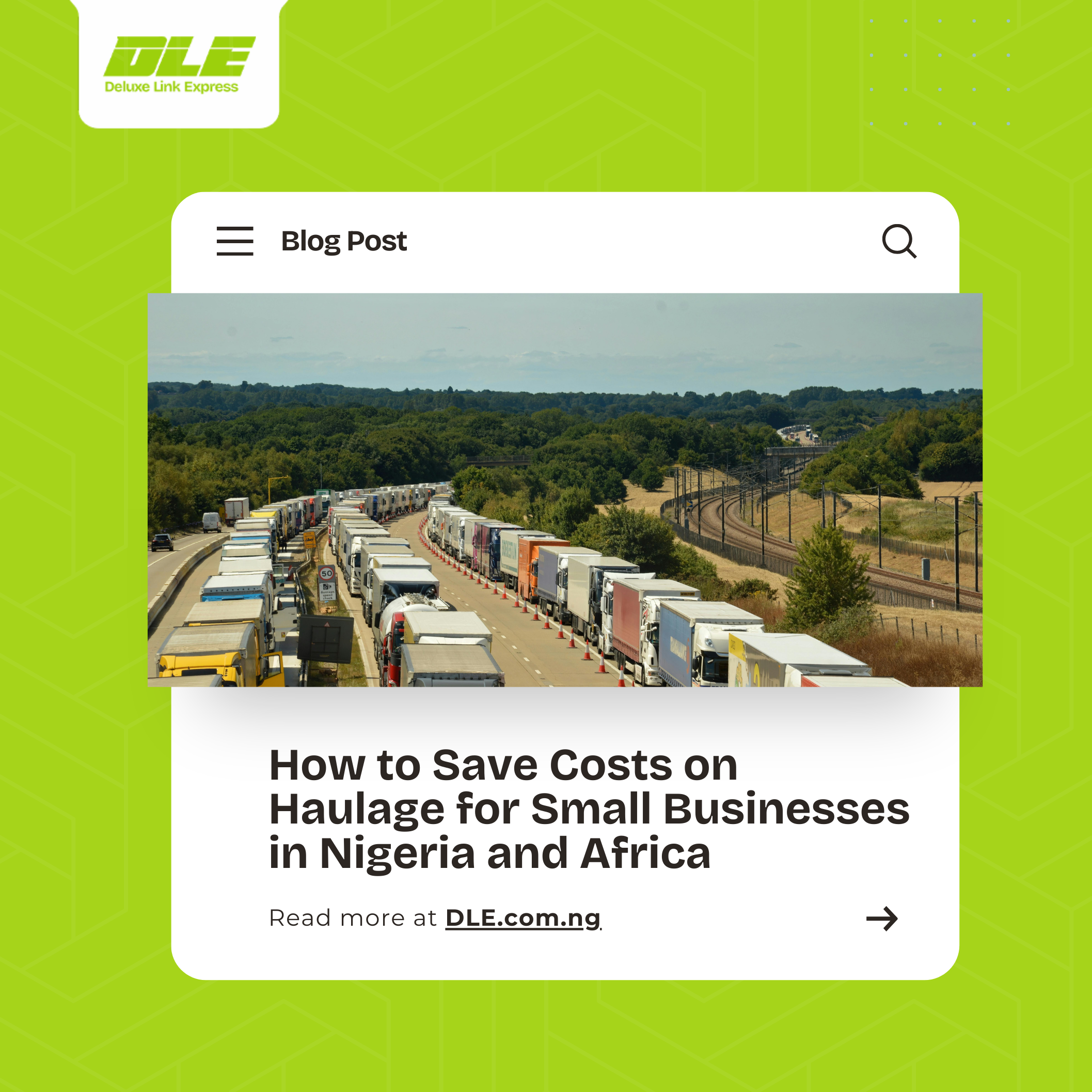
<p>Running a small business in Nigeria or across Africa often means watching every naira, especially when it comes to transportation costs. Here are practical ways to reduce your haulage expenses without sacrificing quality or reliability in the African context.</p> <p><br>Plan Your Routes Carefully<br>Planning efficient routes can save significant fuel and time. Many small businesses in Nigeria see immediate savings by combining multiple deliveries in the same area.</p> <p>Avoiding heavy traffic times in cities like Lagos.</p> <p>Using GPS and route planning apps that work well in Africa to navigate around poor road conditions<br>According to a study by supply chain nuggets, businesses can drastically reduce fuel costs by reducing the distance travelled and idle time.</p> <p>Furthermore, optimized routes allow for more efficient use of vehicles, lowering maintenance costs and increasing fleet lifespan. Your supply chain or business might see significant cost reductions in their operations with fewer kilometers travelled and improved resource allocation.</p> <p>Consider Sharing Loads<br>If you don't have enough goods to fill a truck, look into shared loads with other businesses. This approach is growing in popularity across African markets. Cooperative shipping arrangements can save small businesses between 30-50% compared to booking an entire truck.</p> <p>Negotiate with Local Carriers<br>Don't accept the first quote you receive. Many Nigerian and African carriers are willing to negotiate, especially if you can offer regular business</p> <p>Improve Your Packaging<br>Lighter, more compact packaging means you can fit more items in each shipment. In our experience,optimized packaging can reduce shipping costs by up to 25% through decreased weight and better space utilization.</p> <p>Think About Timing<br>Rush deliveries cost more, especially in Africa where infrastructure challenges can already increase prices. When possible, plan ahead and choose standard shipping options. </p> <p>Consider Using Logistics Aggregators<br>Several African tech startups like Kobo360 and Lori Systems now offer logistics aggregation services, connecting small businesses with available trucks at competitive rates. The increased use of digital information technology in logistics management has resulted in enhanced competitiveness on global scales, by enhancing flow of information, planning, inventory control, packaging/handling, and transportation."</p> <p>Keep Your Vehicles Well-Maintained<br>If you own your delivery vehicles, regular maintenance prevents costly breakdowns on challenging African roads and improves fuel efficiency. In our experience,proper vehicle maintenance can improve fuel economy by up to 30% and significantly reduce breakdown-related delays.</p> <p>Use Mobile Technology to Your Advantage<br>Mobile-based shipping management apps designed for African markets can help you compare rates, track deliveries, and identify inefficiencies. </p> <p>Consider Alternative Fuels Where Available<br>For businesses with their own vehicles, alternatives like CNG (Compressed Natural Gas) or LPG might offer savings in countries like Nigeria where these fuels are available. </p> <p>Both CNG (Compressed Natural Gas) and LPG (Liquefied Petroleum Gas) are considered relatively safe alternative fuels. CNG, being lighter than air, disperses quickly in case of a leak, reducing the risk of fire or explosion ¹ ². On the other hand, LPG is heavier than air and can accumulate near the ground, increasing the potential for ignition and fire hazards.</p> <p>However, it's essential to note that both fuels require proper handling, storage, and maintenance to ensure safety. For instance, CNG tanks must be designed to withstand high pressure, and LPG tanks should be regularly inspected for leaks or damage ¹.</p> <p>In terms of environmental impact, CNG is considered a cleaner-burning fuel than LPG, producing fewer greenhouse gas emissions and air pollutants ². Additionally, CNG vehicles tend to have longer engine lifespans and lower maintenance costs compared to traditional petrol vehicles ².</p> <p>Overall, while both CNG and LPG have their safety considerations, they can be viable and relatively safe alternative fuels for businesses with their own vehicles, especially in countries like Nigeria where they are readily available.</p> <p><br>Join Local Business Associations<br>Many Nigerian and African business associations offer shipping discounts to members. The Small and Medium Enterprises Development Agency of Nigeria (SMEDAN) reports that members save an average of 15% on shipping through their collective bargaining programs.<br>By implementing even a few of these strategies, small businesses across Nigeria and Africa can significantly reduce their haulage costs while maintaining reliable service to their customers.</p> <p>Sources</p> <p><br>https://masgloballogistics.com/2018/11/19/how-to-reduce-haulage-cost-in-nigeria/<br> https://supplychainnuggets.com/route-planning-and-management-in-africa/</p>

Odoh Tobe
13 Mar 2025
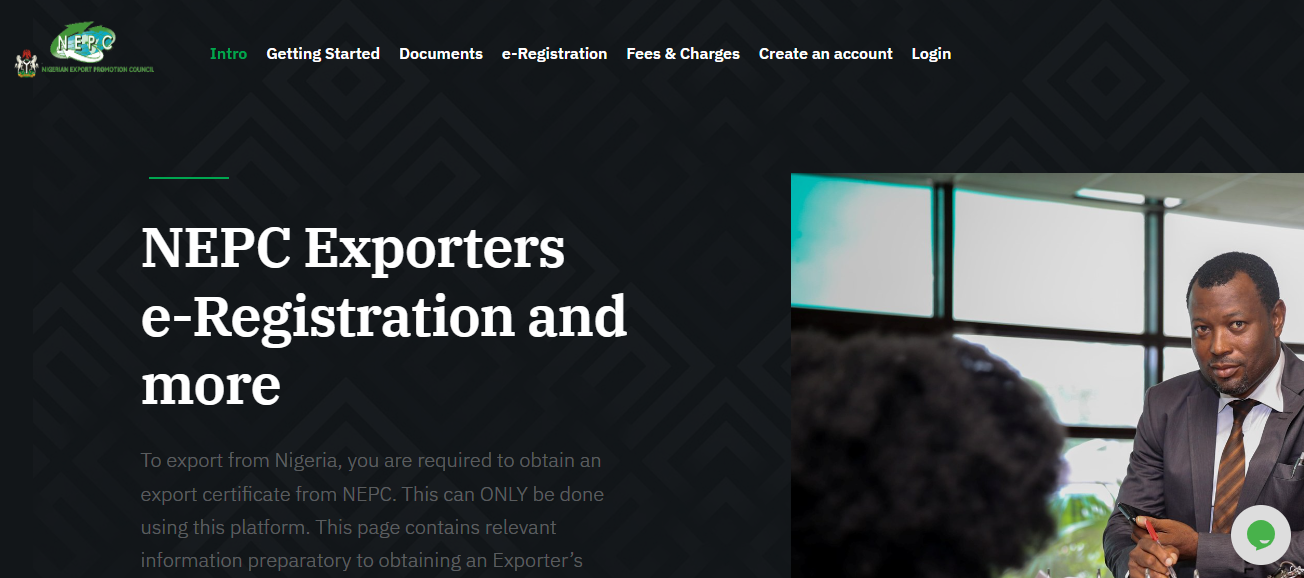
<p>The NEPC (Nigerian Export Promotion Council) certificate is a mandatory requirement for exporters in Nigeria, granting them the authority to ship goods internationally. <br>Here’s a straightforward guide to obtaining your NEPC certificate and expanding your business reach beyond Nigeria.<br>Step 1: Visit the NEPC Portal and Register<br>To begin, go to the official NEPC website at nepc.gov.ng and create an account on the e-registration portal. Have a valid email address and company contact details ready.<br>Step 2: Complete the Application Form<br>After logging in, locate the “New Registration” option to begin the application. You’ll need to provide essential business information, including:<br>• Company details (name, address, phone number)<br>• Tax Identification Number (TIN)<br>• Corporate Affairs Commission (CAC) certificate<br>• Description of your business activities</p> <p>Step 3: Upload Required Documents<br>Prepare the necessary documents to upload on the portal. This typically includes:<br>• CAC certificate (for registered businesses)<br>• Tax Clearance Certificate (if applicable)<br>• Personal identification (e.g., passport or national ID for sole proprietors)</p> <p>Step 4: Pay the Registration Fee<br>The NEPC requires a non-refundable registration fee, which varies based on your business type and scale. Payments can be made through the portal via bank transfer or online payment options. Keep your payment confirmation, as you may need it for verification.</p> <p>Step 5: Application Review and Approval<br>After submission, the NEPC will review your application, which can take up to two weeks. During this period, they may request additional documents or clarification on certain details. Once approved, you’ll receive a digital copy of your NEPC certificate.</p> <p>Step 6: Print and Keep Your Certificate Safe<br>The NEPC certificate is essential for export documentation. Print a copy for your records and to present when processing export transactions or dealing with international clients.</p> <p>Obtaining an NEPC certificate is a key step toward legal export operations in Nigeria. By following these steps, businesses can successfully register, comply with export regulations, and access new international markets confidently.</p> <p> </p>

Odoh Tobe
20 Feb 2025
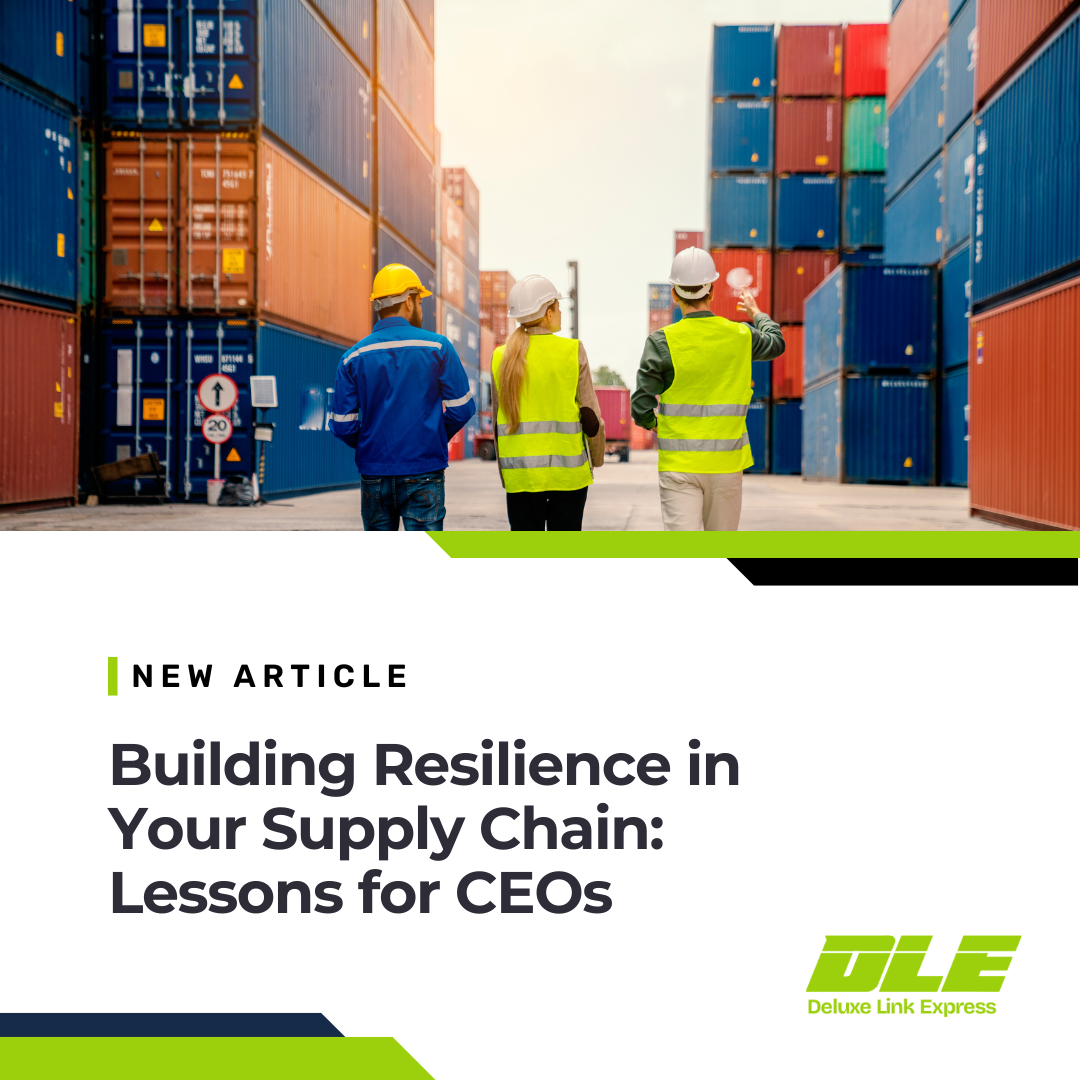
<h2 dir="ltr">Building Resilience in Your Supply Chain: Lessons for CEOs</h2> <p dir="ltr"> Recent global events have shown us how easily the flow of goods can break down. Whether it's necessities becoming scarce or manufacturing materials running low, supply problems can affect any business. Here's how to protect your business and keep your products moving smoothly.</p> <h2 dir="ltr">Your Weak Spots</h2> <p dir="ltr">Think about making a meal. If you're missing a key ingredient, you can't cook - no matter how many other ingredients you have. Your business works the same way. Look at everything you need to make and deliver your products. Which missing items would stop everything? Those are the areas you need to protect first.</p> <h2 dir="ltr"><img src="https://cdn.dle.com.ng/media/uploads/2025/02/image_67b72790dda37.jpg" alt=""></h2> <h2 dir="ltr">Don't Rely on Just One Supplier</h2> <p dir="ltr">Imagine having only one source of water for your home. What would you do if that source dried up? Your business faces similar risks with single suppliers. Find several reliable suppliers in different regions. It might cost more, but it protects your business from unexpected problems.</p> <h2 dir="ltr">Use Simple Technology to Track Everything</h2> <p dir="ltr">Modern tools can help you watch your supplies and spot problems early. It's like having an early warning system - but for your business. Basic computer systems can show you where your materials are and help you notice issues before they become serious.</p> <h2 dir="ltr">Build Strong Supplier Relationships</h2> <p dir="ltr">Good suppliers are like trusted partners - you need to build trust and support each other. Keep in regular contact. Be fair in your dealings. When difficulties arise, suppliers remember who treated them well. Strong relationships often mean the difference between getting your supplies or facing delays.</p> <h2 dir="ltr">Keep Smart Reserves</h2> <p dir="ltr">Having no backup supplies is like having no food stored at home - it works until something goes wrong. But you don't need massive warehouses full of stock either. Keep extra supplies of your most important items. Think carefully about what your business absolutely needs to keep running.</p> <h2 dir="ltr">Have a Backup Plan</h2> <p dir="ltr">What would you do if your main supplier couldn't deliver? Or if transport routes were blocked? Don't wait for problems - plan for them now. It's like having a backup power source - you hope you won't need it, but you're prepared if you do.</p> <h2 dir="ltr">Consider Local Options</h2> <p dir="ltr">While international suppliers might offer better prices, local suppliers can be valuable partners. They can deliver quickly when needed, and you're less likely to face international shipping delays. Try to find some local suppliers for at least part of your needs.</p> <h2 dir="ltr">Train Your Team Well</h2> <p dir="ltr">Make sure everyone in your company knows what to do when problems occur. It's like everyone in a household knowing what to do during an emergency. Clear instructions and regular practice help people solve problems quickly.</p> <h2 dir="ltr">Stay Flexible and Learn</h2> <p dir="ltr">Markets keep changing, and new challenges appear regularly. Stay informed about what's happening in your industry and around the world. Be ready to change your approach when needed.</p> <h2 dir="ltr">The Big Picture</h2> <p dir="ltr">Building a stronger supply chain takes effort and some investment. But when problems arise - and they will - you'll be glad you prepared. The most successful businesses aren't just the ones that work well in good times. They're the ones that can keep going when things get difficult.</p> <p dir="ltr">Remember, you can't stop every problem, but you can be ready for them. Think of it like preparing for different weather conditions - you need to be ready for both sun and rain. In today's connected world, being prepared isn't just wise - it's essential for survival.</p> <h2 dir="ltr">Simple Steps to Start</h2> <ol> <li dir="ltr" aria-level="1"> <p dir="ltr" role="presentation">Make a list of everything you need to run your business</p> </li> <li dir="ltr" aria-level="1"> <p dir="ltr" role="presentation">Find out where each item comes from</p> </li> <li dir="ltr" aria-level="1"> <p dir="ltr" role="presentation">Look for backup suppliers for your most important items</p> </li> <li dir="ltr" aria-level="1"> <p dir="ltr" role="presentation">Start building relationships with local suppliers</p> </li> <li dir="ltr" aria-level="1"> <p dir="ltr" role="presentation">Keep some extra stock of critical supplies</p> </li> <li dir="ltr" aria-level="1"> <p dir="ltr" role="presentation">Write down what to do if supplies are delayed</p> </li> <li dir="ltr" aria-level="1"> <p dir="ltr" role="presentation">Train your team on handling supply problems</p> </li> <li dir="ltr" aria-level="1"> <p dir="ltr" role="presentation">Review and update your plans regularly</p> </li> </ol> <p dir="ltr">The key is to start small but start now. Even small changes can make your business stronger and better prepared for unexpected problems.</p> <p><strong><br><br></strong></p> <p dir="ltr">Sources:</p> <p><strong> </strong></p> <p dir="ltr">Site: <a href="https://www.maersk.com/logistics-explained/supply-chain-management/2024/02/21/building-a-resilient-supply-chain">https://www.maersk.com/logistics-explained/supply-chain-management/2024/02/21/building-a-resilient-supply-chain</a></p> <p dir="ltr"> </p> <p dir="ltr"><a href="https://ware2go.co/articles/supply-chain-resilience/">https://ware2go.co/articles/supply-chain-resilience/</a></p> <p><strong> </strong></p> <p dir="ltr"><a href="https://www.gartner.com/smarterwithgartner/6-strategies-for-a-more-resilient-supply-chain">https://www.gartner.com/smarterwithgartner/6-strategies-for-a-more-resilient-supply-chain</a></p> <p><strong> </strong></p> <p><strong id="docs-internal-guid-c3e6241f-7fff-7dcb-f59d-2d8a9ef247aa"><a href="https://www.vantedgesearch.com/resources/blogs-and-articles/building-resilience-the-new-must-for-supply-chain-leaders/">https://www.vantedgesearch.com/resources/blogs-and-articles/building-resilience-the-new-must-for-supply-chain-leaders/</a></strong></p> <p> </p>

Odoh Tobe
20 Feb 2025

<p id="ember2599">The oil and gas sector is a dynamic, competitive landscape requiring companies to adopt innovative strategies to stay ahead. To achieve sustainable growth and profitability, businesses can focus on four core strategies: <strong>targeted market segmentation</strong>, <strong>strategic alliances</strong>, <strong>streamlined operations</strong>, and <strong>diversification</strong>. These approaches enable companies to address challenges effectively while exploring new opportunities.</p> <h3 id="ember2600">Understanding and Leveraging Market Segmentation</h3> <p id="ember2601">Market segmentation involves identifying distinct groups within a broader market based on factors like geography, customer preferences, or industry focus. This strategy allows businesses to customize their services and marketing efforts, delivering more personalized solutions. The benefits of this targeted approach include:</p> <p id="ember2602"></p> <ul> <li><strong>Enhanced Customer Relationships:</strong> Tailored offerings resonate better with specific groups, building trust and loyalty.</li> <li><strong>Optimized Marketing Campaigns:</strong> Focused efforts lead to higher engagement and return on investment.</li> <li><strong>Efficient Resource Utilization:</strong> Concentrating resources on high-potential segments ensures maximum impact.</li> </ul> <p> </p> <p id="ember2603">For instance, a company might focus on providing renewable energy solutions in urban areas while targeting traditional oil services to industries in rural locations.</p> <p id="ember2604"></p> <h3 id="ember2605">Forging Strategic Alliances</h3> <p id="ember2606">Collaborating with the right partners can significantly amplify a company's market presence and operational capabilities. Partnerships with producers, distributors, or tech innovators allow companies to:</p> <p id="ember2607"></p> <ul> <li><strong>Expand Reach:</strong> Entering new markets or strengthening footholds in existing ones becomes easier.</li> <li><strong>Share Resources:</strong> Pooling expertise and infrastructure reduces costs and operational burdens.</li> <li><strong>Deliver Comprehensive Solutions:</strong> Collaborations enable end-to-end service delivery, improving customer satisfaction.</li> </ul> <p> </p> <p id="ember2608">An example might be forming a joint venture with a renewable energy company to broaden product offerings and cater to environmentally conscious clients. The key to success lies in selecting partners with complementary strengths and shared objectives.</p> <h3 id="ember2609">Boosting Operational Efficiency</h3> <p id="ember2610">Improving operational efficiency is fundamental for maximizing profitability. By embracing advanced technology and refining processes, companies can achieve:</p> <p id="ember2611"></p> <ul> <li><strong>Reduced Costs:</strong> Automation and improved supply chain management minimize overheads.</li> <li><strong>Higher Productivity:</strong> Advanced tools and techniques increase output with less waste.</li> <li><strong>Resilience to Market Volatility:</strong> Proactive risk management ensures stability despite external challenges.</li> </ul> <p> </p> <p id="ember2612">For example, predictive maintenance systems can minimize downtime for critical equipment, ensuring smooth and uninterrupted operations.</p> <h3 id="ember2613">Diversifying Offerings and Markets</h3> <p id="ember2614">Diversification reduces dependency on a single revenue stream and helps companies adapt to changing market dynamics. Businesses can achieve this by:</p> <p id="ember2615"></p> <ul> <li><strong>Exploring New Markets:</strong> Entering previously untapped regions broadens customer bases and increases revenue opportunities.</li> <li><strong>Introducing Alternative Energy Solutions:</strong> Offering renewable energy options attracts a wider range of clients and aligns with global sustainability trends.</li> <li><strong>Expanding Product Lines:</strong> Developing innovative products caters to emerging demands, safeguarding against market fluctuations.</li> </ul> <p> </p> <p id="ember2616">For instance, companies traditionally focused on oil extraction could venture into consulting or alternative energy services, opening up new revenue channels while leveraging their expertise.</p> <h3 id="ember2617">Laying the Foundation for Long-Term Success</h3> <p id="ember2618">By implementing strategies like market segmentation, building strategic partnerships, improving operational efficiency, and diversifying, oil and gas companies can position themselves for success in an ever-evolving industry. Adopting a proactive and innovative approach is key to remaining competitive and achieving sustainable growth.</p> <p id="ember2619"><em>This article was inspired by insights from the Finmodel Labs Blog, a valuable resource for industry strategies.</em></p>

Odoh Tobe
22 Jan 2025

<p dir="ltr">As a logistics company working with businesses across Nigeria, we've seen how global innovations are impacting the logistics landscape here. In this article, we’ll explore five key trends that will change the logistics industry from 2025 and beyond, and how they can help your business stay competitive.</p> <p><strong> </strong></p> <p dir="ltr">1. Smarter Last-Mile Delivery Solutions</p> <p dir="ltr">In Nigeria, delivering goods to the final destination is a challenge, but change is coming.</p> <ul> <li dir="ltr" aria-level="1"> <p dir="ltr" role="presentation">What’s Changing?</p> </li> <ul> <li dir="ltr" aria-level="2"> <p dir="ltr" role="presentation">Delivery systems will use local landmarks for easier navigation.</p> </li> <li dir="ltr" aria-level="2"> <p dir="ltr" role="presentation">More partnerships with local delivery riders to improve service.</p> </li> <li dir="ltr" aria-level="2"> <p dir="ltr" role="presentation">Pickup points at trusted locations like banks and shopping centers.</p> </li> <li dir="ltr" aria-level="2"> <p dir="ltr" role="presentation">Real-time updates through WhatsApp for easy communication.</p> </li> </ul> </ul> <ul> <li dir="ltr" aria-level="1"> <p dir="ltr" role="presentation">What Does This Mean for You?<br>Imagine having a network of reliable delivery partners in one place, much like Uber simplified transportation. You won’t have to rely on different providers anymore—everything will be integrated for smoother operations.</p> </li> </ul> <p dir="ltr">2. Flexible Warehousing Options</p> <p dir="ltr">Renting large warehouses in Lagos or Onitsha is becoming outdated. The future is about flexibility.</p> <ul> <li dir="ltr" aria-level="1"> <p dir="ltr" role="presentation">What’s Changing?</p> </li> <ul> <li dir="ltr" aria-level="2"> <p dir="ltr" role="presentation">Pay only for the storage space you use.</p> </li> <li dir="ltr" aria-level="2"> <p dir="ltr" role="presentation">Track your inventory in real-time across multiple locations.</p> </li> <li dir="ltr" aria-level="2"> <p dir="ltr" role="presentation">Secure temperature-controlled spaces for sensitive goods.</p> </li> <li dir="ltr" aria-level="2"> <p dir="ltr" role="presentation">Shared warehouses in major markets for more convenience.</p> </li> </ul> </ul> <ul> <li dir="ltr" aria-level="1"> <p dir="ltr" role="presentation">What Does This Mean for You?<br>You’ll soon be able to store your products in different locations across the country—like Lagos, Aba, and beyond—and manage everything from your phone. This level of flexibility will help you scale faster and save costs.</p> </li> </ul> <p><strong> </strong></p> <p dir="ltr">3. Simplified Cross-Border Trade</p> <p dir="ltr">The African Continental Free Trade Area (AfCFTA) is changing how businesses' trade across borders.</p> <ul> <li dir="ltr" aria-level="1"> <p dir="ltr" role="presentation">What’s Changing?</p> </li> <ul> <li dir="ltr" aria-level="2"> <p dir="ltr" role="presentation">Digital customs documentation that saves time.</p> </li> <li dir="ltr" aria-level="2"> <p dir="ltr" role="presentation">Real-time exchange rate updates.</p> </li> <li dir="ltr" aria-level="2"> <p dir="ltr" role="presentation">Streamlined export procedures for easier shipping.</p> </li> <li dir="ltr" aria-level="2"> <p dir="ltr" role="presentation">Inventory management that works across multiple countries.</p> </li> </ul> </ul> <ul> <li dir="ltr" aria-level="1"> <p dir="ltr" role="presentation">What Does This Mean for You?<br>As a business owner in Lagos, you’ll be able to manage shipments to places like Ghana, Cameroon, and South Africa with no physical presence in these countries. You’ll be able to move goods just as easily as within Nigeria.</p> </li> </ul> <p><strong> </strong></p> <p dir="ltr">4. E-Commerce Growth and Delivery Innovation</p> <p dir="ltr">E-commerce is rapidly growing in Nigeria, and it’s changing how we think about delivery.</p> <ul> <li dir="ltr" aria-level="1"> <p dir="ltr" role="presentation">What’s Changing?</p> </li> <ul> <li dir="ltr" aria-level="2"> <p dir="ltr" role="presentation">Micro-fulfilment centres will speed up deliveries in urban areas.</p> </li> <li dir="ltr" aria-level="2"> <p dir="ltr" role="presentation">Local delivery startups will work with established logistics companies to cut costs.</p> </li> </ul> </ul> <ul> <li dir="ltr" aria-level="1"> <p dir="ltr" role="presentation">What Does This Mean for You?<br>Just like Amazon’s fast delivery models, Nigerian e-commerce businesses will find ways to offer quicker deliveries. You’ll be able to meet the growing demand for fast deliveries without the added stress.</p> </li> </ul> <p><strong> </strong></p> <p dir="ltr">5. Using Data to Make Smarter Decisions</p> <p dir="ltr">The future is about using data to improve your logistics operations.</p> <ul> <li dir="ltr" aria-level="1"> <p dir="ltr" role="presentation">What’s Changing?</p> </li> <li dir="ltr" aria-level="2"> <p dir="ltr" role="presentation">Delivery times will be predicted based on traffic patterns.</p> </li> <li dir="ltr" aria-level="2"> <p dir="ltr" role="presentation">Regional demand will be forecasted to better plan inventory.</p> </li> <li dir="ltr" aria-level="2"> <p dir="ltr" role="presentation">Customer behaviour will be analysed to improve service planning.</p> </li> <li dir="ltr" aria-level="1"> <p dir="ltr" role="presentation">What Does This Mean for You?<br>Imagine knowing that orders in Surulere peak on Thursdays, while orders in Ikeja surge on weekends. This data will help you plan better, saving time and money while improving customer satisfaction.</p> </li> </ul> <p><strong><br><br></strong></p> <p> </p>

Odoh Tobe
22 Jan 2025

<p id="ember49">Choosing the wrong logistic partner can cost your business time, money, and customer trust. Before you sign that contract, watch out for these warning signs that might indicate trouble ahead.</p> <h3 id="ember50">1. Lack of Clear Performance Metrics</h3> <p id="ember51">When a logistics company can't or won't share their:</p> <p id="ember52"></p> <ul> <li>Delivery success rates</li> <li>Customer satisfaction scores</li> <li>Average delivery times</li> <li>Package tracking accuracy</li> </ul> <p> </p> <p id="ember53">This could mean they're hiding poor performance or not tracking these vital metrics. A reliable partner, like DLE with our 95% delivery success rate and 90% customer satisfaction, should be proud to share their numbers.</p> <h3 id="ember54">2. Limited Technology Integration</h3> <p id="ember55">Be wary if a logistics company:</p> <p id="ember56"></p> <ul> <li>Doesn't offer real-time tracking</li> <li>Uses outdated ordering systems</li> <li>Can't provide regular status updates</li> <li>Has no digital platform for managing shipments</li> </ul> <p> </p> <p id="ember57">In today's digital world, strong technology infrastructure isn't optional - it's essential for reliable service and keeping your customers informed.</p> <h3 id="ember58">3. Unclear Pricing Structure</h3> <p id="ember59">Watch out for:</p> <p id="ember60"></p> <ul> <li>Hidden fees that appear after signing</li> <li>Complicated pricing models</li> <li>Reluctance to provide detailed quotes</li> <li>Lack of transparency about additional charges</li> </ul> <p> </p> <p id="ember61">A trustworthy logistics partner will be upfront about their pricing structure and clearly explain all potential costs before you commit.</p> <h3 id="ember62">4. Poor Communication Systems</h3> <p id="ember63">Red flags in communication include:</p> <p id="ember64"></p> <ul> <li>No dedicated customer service team</li> <li>Limited contact options</li> <li>Slow response times</li> <li>No clear escalation process for problems</li> </ul> <p> </p> <p id="ember65">Your logistics partner should be easily reachable through multiple channels and ready to address your concerns promptly, just as our 24/7 support team does at DLE.</p> <h3 id="ember66">5. Limited Infrastructure and Coverage</h3> <p id="ember67">Be cautious if you notice:</p> <p id="ember68"></p> <ul> <li>Few physical locations</li> <li>Limited fleet variety</li> <li>No strategic positioning near major transport hubs (Lagos, Abuja etc.)</li> <li>Inability to handle different types of shipments</li> </ul> <p> </p> <p id="ember69">A reliable logistics partner should have strategic facilities, like DLE's multiple locations near major transportation hubs, ensuring efficient delivery networks and faster service.</p> <h3 id="ember70">How to Protect Your Business</h3> <p id="ember71">Before partnering with a logistics provider:</p> <p id="ember72"></p> <ol> <li>Request a detailed service presentation</li> <li>Ask for customer references</li> <li>Start with a trial period if possible</li> <li>Review their track record and certifications</li> <li>Visit their facilities if you can</li> </ol> <p> </p> <p id="ember73">Remember, your logistics partner directly impacts your customer satisfaction. Don't rush the selection process - take time to evaluate their capabilities thoroughly.</p> <p id="ember74">The right logistics partner can help your business grow, while the wrong one can damage your reputation and bottom line. By watching out for these red flags, you can avoid partnerships that might hurt your business in the long run.</p> <p id="ember75">When you're ready to work with a logistics partner that prioritizes transparency, technology, and customer service, consider DLE. With our proven track record and commitment to excellence, we're ready to help your business succeed.</p> <p id="ember76">Want to learn more about reliable logistics solutions? Contact DLE at <a href="mailto:info@DLE.com.ng" target="_self" data-test-app-aware-link="">info@DLE.com.ng</a> or call 0916 271 3750 for a consultation.</p>

Odoh Tobe
17 Jan 2025
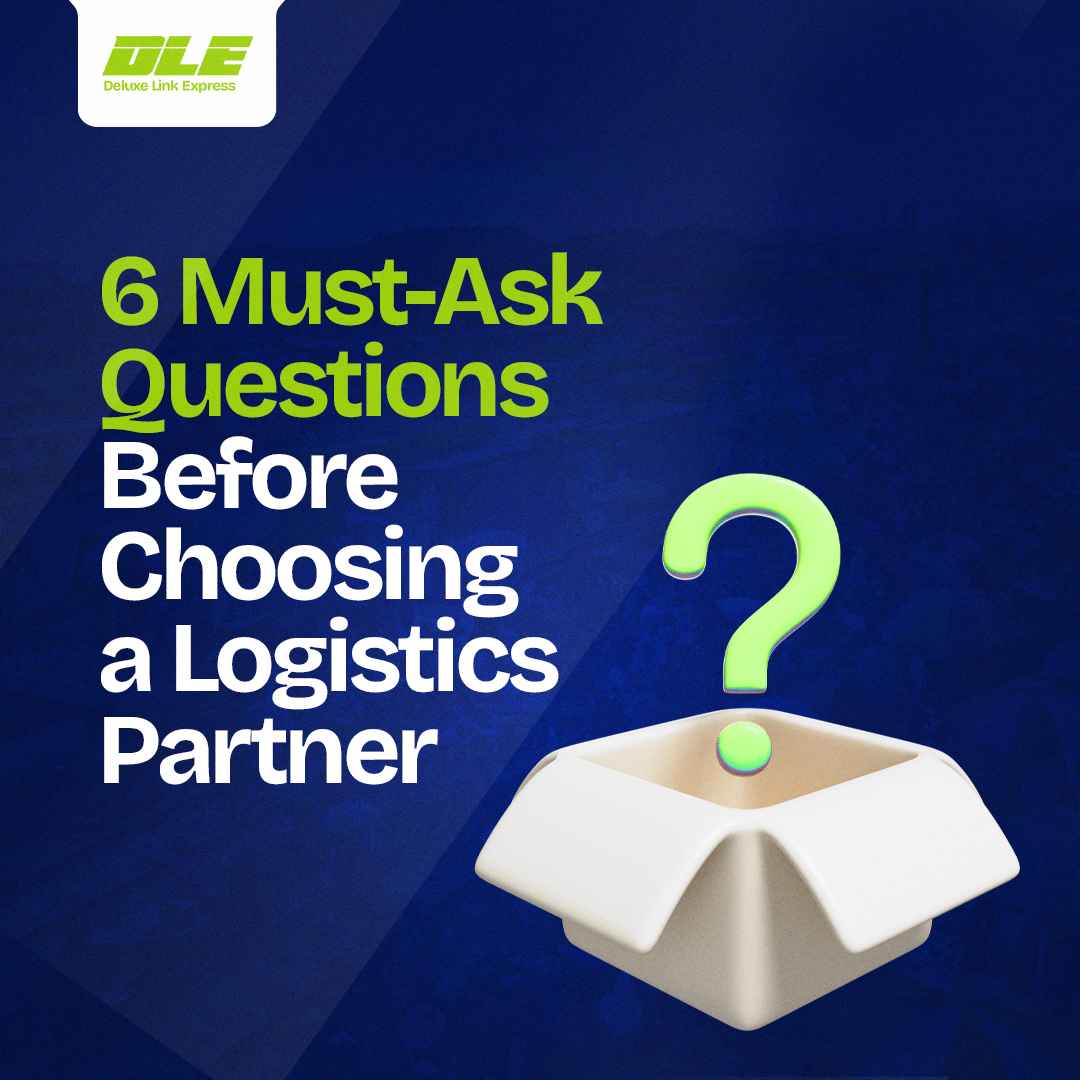
<p>Selecting the right logistics partner is a critical decision for your business. The right choice can help streamline your operations, delight your customers, and boost your bottom line. But how do you know which logistics partner is the best fit? Here are six must-ask questions to guide your decision.</p> <p>1. How Reliable Is Their Delivery Network?</p> <p>Reliability is key when choosing a logistics partner. Ask about their delivery times, success rates, and contingency plans for unexpected delays. A dependable partner ensures your products reach your customers on time, every time.</p> <p>At DLE, our robust delivery network is designed to handle even the most complex logistics challenges. From last-mile delivery to bulk shipments, we’ve got you covered.</p> <p>2. Do They Offer Advanced Technology?</p> <p>In today’s fast-paced world, technology is a game-changer. Does your logistics partner provide tools like real-time tracking, automated updates, and an easy-to-use platform?</p> <p>DLE’s web app offers all these features and more. With our platform, you can manage shipments, track deliveries in real-time, and gain valuable insights—all from the palm of your hand.</p> <p>3. What’s Their Cost Structure?</p> <p>Understanding pricing is crucial. Are there hidden fees? How transparent are they about costs?</p> <p>We at DLE pride ourselves on clear and straightforward pricing. No hidden charges, no surprises—just fair rates that help you plan your logistics budget effectively.</p> <p>4. Can They Handle Your Unique Business Needs?</p> <p>Every business is different. Whether you’re shipping fragile items, need cold storage, or require customized solutions, your logistics partner should be able to accommodate your specific needs.</p> <p>DLE specializes in tailored logistics solutions, ensuring we meet the unique demands of your business.</p> <p>5. How Responsive and Supportive Is Their Customer Service?</p> <p>Strong customer support is often overlooked but is vital for smooth operations. When issues arise, how quickly and effectively do they respond?</p> <p>DLE’s customer support team is always available to assist you. Every customer is assign a dedicated customer care executive. Whether it’s a simple question or a complex issue, we’re here to ensure your logistics run without a hitch.</p> <p>6. Do They Help You Track and Manage Shipments?</p> <p>Real-time tracking and seamless shipment management are essential. Can your partner provide visibility into every step of the logistics process?</p> <p>With DLE, you get complete transparency and control. Our app’s tracking features empower you to monitor shipments at every stage, keeping you and your customers informed.</p> <p>Why DLE Is the Right Choice</p> <p>DLE combines reliability, advanced technology, transparent pricing, customized solutions, exceptional customer support, and powerful tracking tools to deliver unmatched logistics services. Choosing DLE means choosing a partner who prioritizes your success.</p> <p>Ready to take your logistics to the next level? Let’s make it happen!</p>

Odoh Tobe
15 Jan 2025
Design goes here
Product goes here
Software Engineering goes here
Customer Success goes here
Got any questions?
Find the answers you need right here. Whether you have questions about shipping, tracking, returns, billing, or anything else related to your order, we've got you covered.
Connect with an expert

